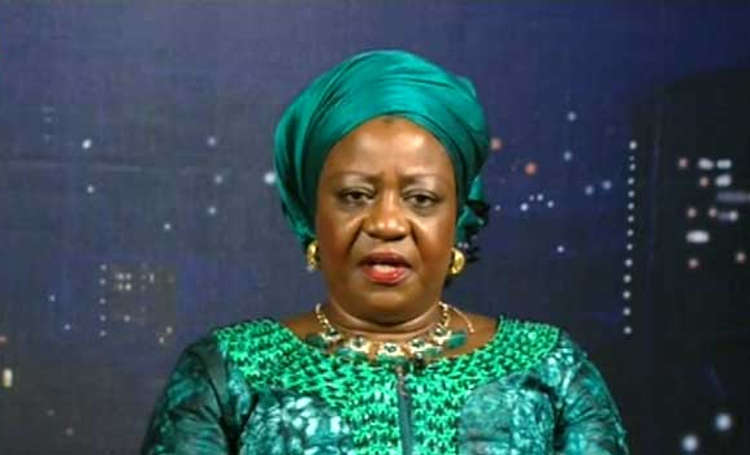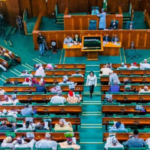By: Onyeisi Chiemeke
If there is a calibrated index of President Muhammadu Buhari’s supporters on the social media, Ms. Lauretta Onochie will rank amongst the top contestants to take the trophy.
For that reason, it is not a surprise that since the announcement, about eight months ago, by the Senate President, Ahmad Lawan of the President Muhammadu Buhari nominating her as one of the commissioners for the Independent National Electoral Commission (INEC), the battle over her appointment has shifted to the social media her favorite turf.
- INEC removes polling units from shrines, worship centers
- 2023: INEC to publish list of new polling units next week
The core of the arguments of her traducers or opponents is the fact that for her alleged partisanship, she is disqualified from being nominated or being a commissioner of INEC considering the fact that such a body is required to act with such utmost good faith by its non-partisanship and by extension its personnel. Partisanship in this sense may be an act by a person of showing too much support for one person, group or idea.
We can do away with few preliminaries by not dwelling much on the fact of the legality of her nomination, as there is only one person vested with the authority to nominate her as a commissioner of the INEC in this case the president. Secondly, whether the National Assembly will approve her nomination we believe may be in the realm of public sentiments and not the legality of her qualification as a result of her alleged partisanship.
The Constitution of the Federal Republic of Nigeria (1999) by virtue of section 153(1F) established the INEC, as it said; there shall be established for the nation the following bodies namely – Independent National Electoral Commission (INEC) it went further to state in section 153(2); the composition and powers of each body established by sub-section (1) of the section as contained in Part (1) of the third schedule to this constitution. In the said Part 1 of the third schedule of the Constitution, particularly section 14, the composition and process of appointment of the commissioners of INEC are set out. It says in Section 14(1);
the Independent National Electoral Commission shall comprise the following members –
(a) the Chairman, who shall be the chief Electoral Commissioner; and
(b) 12 other members to be known as National Electoral Commissioners.
Who shall be persons of unquestionable integrity and not be less than 50 years and 40 years of age respectively.
Further, section 14(2) states that;
(a) there shall be for each state of federation and the federal capital territory, Abuja, a resident Electoral Commissioner who shall be appointed by the President,
(b) the person of unquestionable integrity.
(c) not be less than 40 years of age.
What is clear is that for the appointment of commissioners of INEC, there are two basic requirements to be fulfilled, and they are:
Such person(s) being person(s) of unquestionable integrity
Being not less than 40 years old.
If these were, the two basic requirements, as provided for by the Constitution of the Federal Republic of Nigeria (1999), where then cometh the objection with regard to the nomination of Mrs. Onochie as INEC commissioner? The obvious answer seems to be on the fact that she is an adviser on social media to the president, who as her appointor for her current job has now gone ahead to nominate her as a commissioner for INEC. This argument for ethical reasons that we shall come back to sounds logical, taking into consideration that for the reasons of the antecedent of her appointment as an adviser to the President, it may be difficult for her to distance her loyalty to the president in her new place of work. But this argument may not be sustained for the reasons of the fact that the argument does not have a legal foundation on the requisite requirements for such appointment as provided for by Section 14(1), Part I of the Third Schedule of the Constitution of the Federal Republic of Nigeria (1999).
We do not know, but we may speculate that those opposed to her nomination are finding refuge in the clause Unquestionable integrity. Oxford Advanced Learner’s Dictionary defines Unquestionable as – that that cannot be doubted; unquestionable honesty and integrity. It further defines integrity as – the quality of being honest and having strong moral principle. If this is the plank upon which the opposition wishes to stand in the further opposition to her confirmation by the senate, there may be a problem, and the problem is that parties are now beginning to dwell on the realm of facts which may require that onus will be on those opposed to her nomination to show that character weaknesses in her public or private life that point to the fact that she is a person of questionable character. And there is no adduced evidence to that effect more than the fact of her partisanship which may point to the allegation of her membership of the All Progressive Congress (APC).
But if again we go back to section 14, Part 1 of the Third Schedule of the Constitution of the Federal Republic of Nigeria (1999), there is no provision that a member of a political party cannot be a commissioner or staff of INEC. This is not to wish away the fears of person(s) who are afraid, knowing the political culture of Nigeria, that to make a card carrying member of a political party in Nigeria an INEC commissioner may just open the floodgate for the perpetration of electoral fraud by such person(s) on behalf of their political parties. This fear should not be taken lightly, taking into consideration a recent experience in the United States of America, where in the State of Georgia in the 2018 Governorship Election, the Democrats accused the Secretary of government of the State of Georgia, a Republican, who was the chief electoral officer in line with the United States of America’s electoral system of gerrymandering-a system of creating more electoral constituencies to favour one political interest in this case, the Republicans against another political interest. We do not want to go into the counter argument by her supporters that there may be other commissioners who are closet members of other political parties, because as the popular African saying states; it is the dog seen with excreta that is guilty of eating excreta.
We can only ask the question whether in truth being a member of a political party and subsequently, an electoral body creates a situation that may make the person partisan. Even in the United States example we cited, despite the fact that the offices of Secretary to the State Government are in charge of conducting both states and national elections the overwhelming evidence does not support the bias of such electoral officers for their political parties. For instance in Sierra Leone too, members of the political parties form part of the members of the electoral commission. In effect, the problem may lie elsewhere in this case, the deficit of ethics with which our politics is conducted.
It is our humble opinion that no law has been infracted upon, either in her nomination by the president, or where possible her confirmation by the Senate of the Federal Republic of Nigeria. We can situate the argument properly by questioning whether it is ethically right for an appointee of the president elected by a political party to make one of his appointees a member of an electoral body charged with the responsibility of conducting elections of which the president’s party in the present and in the future will be a contestant. But as we said, we do not see a law that bars her from holding such an office.
Onyeisi Chiemeke is a Legal Practitioner based in Lagos. He is also a writer and he is the author of the book; June 12 Election: Campaign for Democracy and the Implosion of the Nigerian Left.




